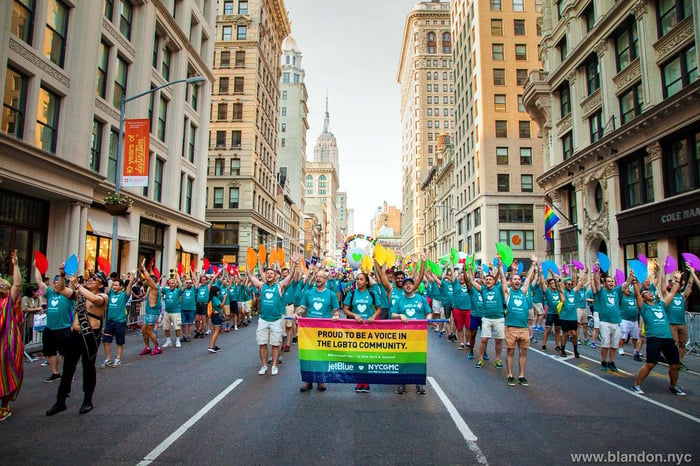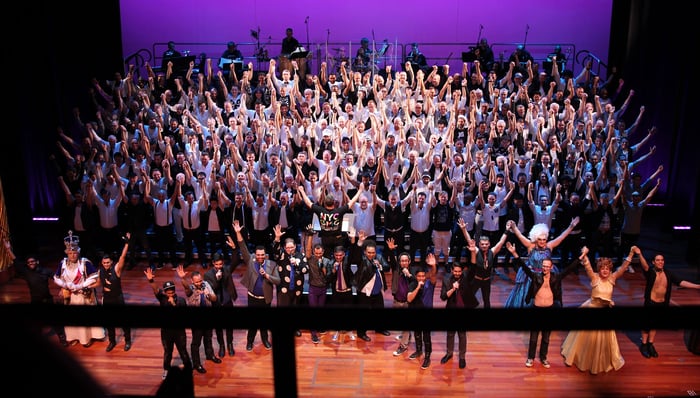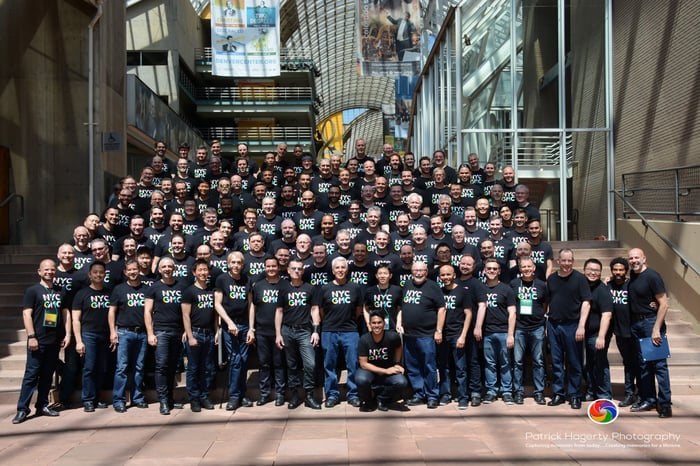
When considering how choruses can take up the fight for inclusion and equity within their own organizations, designating a team to spearhead the charge can be a great first step.
In the case of the New York City Gay Men's Chorus, two years ago they formed a 12-member committee: the Inclusion and Equity Initiative (IEI). The purpose of this committee was to educate the chorus on what it means to be inclusive; helping chorus members feel more comfortable expressing their identities and being themselves.
How It All Began
Christian Tanja, a member of IEI, says that IEI came "at a significant time in visibility where there was, and still is, a movement of gay choruses working towards discussions around race and gender dynamics. They are really redefining what inclusivity and diversity means [in the choral setting.]" IEI started to look at how to handle diversity in particular with NYCGMC - how to get exposure to different types of memberships, what communications were needed to champion diversity, how their music choices reflect their values of diversity and inclusion, and ultimately, how to create a culture of openness and acceptance.
Antonio Torrence, a fellow member of IEI, says "We looked at our entire lifecycle of the chorus - from people who see us visibly in the community, to those who express interest of joining, and to new members when they join."
IEI started by identifying things that needed to be addressed, creating a statement of inclusion and equity, and developing a framework for exploring issues. Getting buy-in from the leadership and members was an important step in the process but, like with most changes in a choral organization, IEI was met with some pushback. As Tanja says "There is this false assumption that we, as a LGBT organization, know what it means to be marginalized and therefore are better [at inclusivity]. But there's still a lot more work to do!"
IEI helped members adopt this new statement of inclusion and equity slowly but steadily through a variety of initiatives, training, and open communication channels. Tanja says that true and open "dialogue doesn't happen in a 5-10 minute speech in announcements. We had to find a way for people to adopt this concept in daily conversations by creating an access point during announcements and having a space for very personal conversations." It's a long process, but IEI works hard to ensure that every season, there is a discussion about inclusivity in the chorus and that new members are educated as well.
Open Communication Channels With "Member Ambassadors"
In order to open up communication around inclusion, the IEI team designated "member ambassadors" within each section of the chorus. These ambassadors are the main point of contact for members who have concerns regarding inclusion in the organization. Whether it be an issue with the repertoire, another member, or the organization's culture itself, any chorus member can take their concerns to their designated advocate. The advocate discusses this information with the IEI team, which then reviews the concern and comes up with a recommended plan for addressing the issue. Tanja says that a challenge has been to "identify what the difference is between a general membership issue and an IEI issue. It's a learning process but at least we are creating a dialogue of what those issues are and fostering a culture of transparency."
Inclusion and Equity Initiative Projects
In its two years of existence, IEI has implemented a variety of projects to help the chorus become a more inclusive and safe space.
The creation of name tags with gender pronouns led to a greater awareness about the spectrum of gender and gave people an opportunity to openly share their pronouns without needing to be asked. The recruitment task team addresses specific issues of representation and seeks to attract and support more members of color in the chorus by recruiting from different populations across New York. And the music advisory committee sits down with the Artistic Director, checks repertoire for possible hot buttons, and ensures the repertoire is inclusive enough. Tanja says this helps "give an appreciation and awareness of where the music is coming from." Torrence adds, "even Artistic Directors sometimes need to be educated about inclusivity!"
Welcoming Diversity

Despite its specific title, NYCGMC has welcomed members who do not identify as gay men into their chorus. Leo Campos, a cis straight male and member of IEI, joined the chorus in 2010 at the recommendation of his friend, a member of NYCGMC. Campos had been coming to NYCGMC concerts for years and fell in love with the group, its repertoire, and its sense of humor. Until he was asked to audition, he had never considered it as an option for him, assuming that they would not accept straight members into the chorus. "When you audition, it's assumed you're a gay person. I was accepted into the chorus, went to rehearsals, and didn't say anything about my sexual orientation; I was essentially 'in the closet' for about a month. One night we were at a bar, and I finally came out to everyone." He continues, "The chorus is generally very welcoming. I'm not treated any differently. I realize that my 'straightness' is a privilege and I use that privilege to help the LGBT community. [Singing in the chorus] is how I show my advocacy." The chorus has also welcomed other cis straight males, cis female members, and gender non-conforming members.
But openness to members of varying sexual orientation, gender identity, and gender expression isn't the only way the chorus diversifies. The chorus is now participating in outreach projects which include going to the outer boroughs of New York and singing there to recruit new members. This has resulted in good progress towards adding more people of color to this predominantly white group. Campos stresses the importance of maintaining a culture of inclusion when singers join the chorus, "you have to continue to make sure that everyone has protection and a safe space regardless of cultural differences, age differences, or financial disparity."
Torrence states that the, "diversity inclusion committee has an attitude of inclusive excellence. Our statement is to be excellent at what we do, but can only be excellent if we include everybody!"
Measuring Impact

It's always a challenge to precisely measure the impact of initiatives like IEI. But Torrence says that since the installation of IEI, "the chorus consciousness has been raised 120%." He continues, "For me, the biggest impact has been through conversation. When we started, we weren't certain how receptive people would be. But then we look at the people who have reached out to us to voice their concerns and seeing how we have successfully addressed those issues - that shows that it matters. We've seen some changes in our repertoire and in our HR policies as a result of IEI's work."
Tanja says that another tangible component of their success is from, "Seeing the 'Nightingale Brigade,' which focuses on the health of our organization, and how they embrace [this culture of inclusion.] Our ability to provide resources and see how members have used them has shown how impactful it is. We are very happy with our success but we still have a lot to do!"
What is your chorus doing to foster inclusion and equity within the organization? Let us know in the comments!

Tori Cook is the former Director of Sales & Marketing at Chorus Connection, an active board member of the Greater Boston Choral Consortium, and a soprano with the Tanglewood Festival Chorus. In a past life, she was the Music Director of the Harborlight Show Chorus and President of Chorus pro-Musica. When not making music, she daydreams about adopting a golden retriever puppy and scuba diving to exotic locations around the world.

